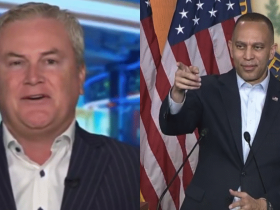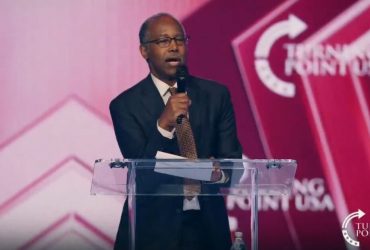Adam Smith/Source: Wikicommons
Guest post by Drieu Godefridi
In a world where the global economy bristles with grievances, lamentations and threats, the U.S. tariffs against China arouse anger and incomprehension. Labeled as retrograde protectionism, these tariffs – of up to 145% – are nonetheless defensible in the light of Adam Smith, titan of liberal thought. Far from caricatures, Smith, in The Wealth of Nations (1776), was no zealot of unilateral free trade. His nuances, rooted in pragmatism, offer a surprising reading grid for understanding Republican politics.
China closed
Let’s start by setting the scene. The United States, in imposing these tariffs, aims to rebalance a Sino-American trade relationship that it deems iniquitous: an abysmal trade deficit ($400 billion in 2018, before the first tariffs), systematic and even systemic theft of intellectual property by Beijing, and a worrying strategic dependence for key sectors such as steel or semiconductors.
Purists cry scandal, invoking free trade and peace through commerce. But what is Adam Smith really saying?
The author of The Wealth of Nations certainly despised artificial restrictions. Take his criticism of tariffs favoring local monopolies: “To give the monopoly of the home-market to the produce of domestic industry, in any particular art or manufacture, is in some measure to direct private people in what manner they ought to employ their capitals, and must, in almost all cases, be either a useless or a hurtful regulation.” (Book IV, Chapter II). At first glance, U.S. tariffs, by protecting American steel or electronics, for example, are open to criticism. They distort the market, make goods more expensive for the US consumer, and risk diverting capital to less competitive industries. The figures bear this out: tariffs cost around 0.2% of US GDP in 2019, a toll paid by households via higher prices.
First exception: national defense
But Smith did admit exceptions, and the first resonates with US rhetoric: national defense. The Navigation Act, or more precisely the Navigation Acts, refers to a series of laws passed by the British Parliament between 1651 and 1733 to regulate trade within the British Empire. Their aim was to maintain England’s strategic and maritime primacy. Let’s read Smith: “The act of navigation is not favourable to foreign commerce, or to the opulence which can arise from it… As defence, however, is of much more importance than opulence, the act of navigation is, perhaps, the wisest of all the commercial regulations of England.” (Book IV, Chapter II).
Trump’s aim in taxing Chinese steel from 2018 is not just to resurrect American blast furnaces (although the symbol has panache). It’s about reducing dependence on a geopolitical rival whose rise threatens American security. In 2017, China produced 50% of the world’s steel – with an output of around 831 million metric tons out of a global total of around 1.69 billion tons, according to World Steel Association data – often subsidized, crushing competitors with fire-sale prices. If America loses its ability to produce strategic materials, what does it become in the event of conflict? A nation of traders, influencers, and woke whiners? Smith, a pragmatist, would have understood the argument: security takes precedence over short-term advantage.
But above all, free trade is like tango: it takes two. Through its non-tariff barriers and a thousand other disingenuous means, China has closed its market to Western companies in most sectors. The West lies gaping in the face of a China that is essentially closed to it. There is nothing free in this exchange, only a partner (the West) that finances the rise of a regime that dreams of crushing it.
Second exception: retaliation against closed countries
Precisely, Adam Smith was in favor of what he called retaliation against cheating partners such as China. “There may be good policy in retaliations of this kind, when there is a probability that they will procure the repeal of the high duties or prohibitions complained of. The recovery of a great foreign market will generally more than compensate the transitory inconveniency of paying dearer during a short time for some sorts of goods.” (Book IV, Chapter II). It couldn’t be clearer!
The American objective? Force China to negotiate and open its markets – or lose the American market. Beijing, with its non-tariff barriers, massive subsidies, and disregard for WTO rules (such as patent plundering), is not a fair-play partner. In fact, American tariffs led to the Phase 1 agreement in 2020, in which China pledged to buy more American goods and to protect intellectual property. The result was mixed, admittedly – Beijing kept only 60% of its purchase promises – but the leverage worked. Smith, who detested state-backed monopolies – and China is one of them- nationwide – would have applauded this attempt to restore a semblance of fairness.
Third reality: Smith’s hatred of non-tariff barriers
Smith had a deep-seated hatred of non-tariff barriers, which under various pretexts, notably sanitary, are designed to exclude outside competition: “The laudable motive of all these regulations, is to extend our own manufactures, not by their own improvement, but by the depression of those of all our neighbours, and by putting an end, as much as possible, to the troublesome competition of such odious and disagreeable rivals.” (Book IV, Chapter VIII). China is the Mozart of non-tariff barriers. Here’s what Politico, unsuspecting of sympathy for Trump, wrote this weekend: “This is what China does – trade action masquerading as legit public policy based on science. (…) Such technical trade barriers give Beijing two bangs for the buck – plausible deniability and lethality.’
Conclusion: U.S. tariffs in line with Adam Smith’s thinking
Faced with a closed and doleful China, free-trade orthodoxy seems very fragile. Beijing manipulates its currency, subsidizes its industrial champions and closes its domestic market while flooding the world. The USA, with its tariffs, has broken a taboo.
So, would Smith bless Trump’s tariffs? Not without gnashing his teeth. He would have praised the strategic boldness – protecting defense, countering an unfair adversary – but deplored the collateral damage and the risks of one-upmanship. Let’s just say that Trump, like a sometimes brutal surgeon, operates with a kitchen knife without anesthetic.
But faced with a cheating, torturing colossus like China, subtlety is a coward’s screen. Smith, as a realist, understood this.
Drieu Godefridi is a jurist (University Saint-Louis, University of Louvain), philosopher (University Saint-Louis, University of Louvain) and PhD in legal theory (Paris IV-Sorbonne). He is an entrepreneur, CEO of a European private education group and director of PAN Medias Group. He is the author of The Green Reich (2020).
You can follow Drieu on X.
The post Tariffs Against China? A No-Brainer, According to Adam Smith appeared first on The Gateway Pundit.











